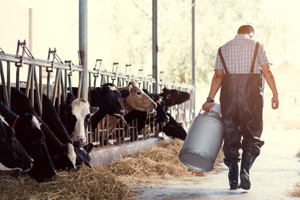Consumers Unite!
[This article was previously published in the summer issue of The Cultivator, Cornucopia’s quarterly newsletter.]
by Kestrel Burcham, JD, Director of Domestic Policy at The Cornucopia Institute and Melody Morrell, Operations Director
 |
Family-scale organic dairies are struggling to make ends meet. Many have already lost their farms and businesses, some of which have been in the family for generations.
At their biannual meeting in April, the National Organic Standard Board (NOSB) heard from multiple family-scale dairy farmers about how their businesses are failing due to the inconsistent application of organic principles during certification.
For example, a small number of very large “organic” dairies are disregarding the origin of livestock rules by continuously cycling conventional livestock into production. Industrial organic operations, whose cows spend most of their lives in the feedlot, also struggle to meet even the most modest pasture requirements.
Authentic organic dairy farmers easily exceed the pasture requirements for organic livestock: 30% dry matter intake (DMI) and a minimum 120-day grazing season for each individual animal.
What’s more, the grain being fed in industrial operations may not actually be organic. In 2018, Cornucopia Director of International Policy Anne Ross, JD, exposed a network of fraudulent grain importers from overseas.
Available data shows the U.S. is importing more than they can possibly grow. This grain is cheap and abundant compared to real organic grain, making it an attractive choice for livestock factories.
Several dairy farmers shared emotional stories at the spring NOSB meeting in Seattle—about their families losing their homes, about financial ruin, about watching other dairies break or bend the organic rules without consequence, while their own ethical practices put them further and further into debt.
These farmers noted that the lack of an origin of livestock rule allows some organic dairies to get rid of their calves and, instead, buy conventional heifers that are transitioned to organic over one year. This practice gives dairies a financial leg up because it allows them to sell the organic milk produced, instead of feeding it to baby calves.
During the meeting, it became clear that the National Organic Program (NOP) is unwilling to push a rule change that would clarify the language on origin of livestock because the proposed rulemaking from 2015, never enacted, is now thought to be outdated. NOP staff are concerned the dairy industry has changed too much, necessitating a new origin of livestock rule.
The 2015 proposed origin of livestock rule had major deficiencies, including loopholes that could allow the current problems in the industry to continue unchecked.
Unfortunately, whether the 2015 proposed rule is pushed forward or a new origin of livestock rule is created, it could still be two or more years before any regulation is enacted. In the meantime, more family-scale dairies will be lost.
That loss is devastating, not only for authentic farmers, but also for consumers. Consumers become disillusioned when massive factory-farm operations are allowed to operate outside of the organic laws and still carry the USDA organic seal.
The organic marketplace is scale-neutral, meaning both small and large operations should be able to participate within the spirit and the letter of the law. These industrial dairies are taking advantage of consumers by charging a premium for milk, while undercutting authentic organic dairies.
Cornucopia has long called for better enforcement of the existing rules, insisting an end to this fraud and a leveling of the playing field. The NOP, however, has suggested—at the recent NOSB meeting and in policy statements—that they do not plan to put any organic operations out of business.
Certifiers perpetuate the problem by applying the rules and guidelines inconsistently. Cornucopia’s report, The Gatekeepers of Organic Integrity, highlights the role of accredited certifiers in this debacle. The organic marketplace is now effectively divided, and consumers are being duped.
While the factory farm and store brands are dollars cheaper than real organic, they are essentially overpriced conventional milk.
Cornucopia is calling on consumers to help us support legitimate organic dairies. Wielding our voices and purchasing power, consumers can have a profound impact to help these farms survive and continue to provide the most nutritious milk in the marketplace.
Keep an eye out in upcoming weeks as we launch a social media campaign to highlight the very best organic dairies, their cows, and their superior products: seeing is believing.
We ask all consumers to commit to buying only authentic organic dairy, starting with your next trip to the store. Send the message that you do not condone “organic” factory farming, and share your commitment to support the highest-integrity organic brands produced by the most dedicated dairy farmers.
Cornucopia’s Organic Dairy Scorecard can help conscientious consumers advocate for the most authentic dairy brands.
Use our ratings to identify 5-, 4-, and 3-cow rated dairy products in your neighborhood co-op or grocery, or seek out an organic, grass-based dairy farmer to buy from directly in your local community.
Your food dollars keep real organic dairies in business, send a message to “faux-ganic” producers, and nourish your loved ones—that is a bargain!

